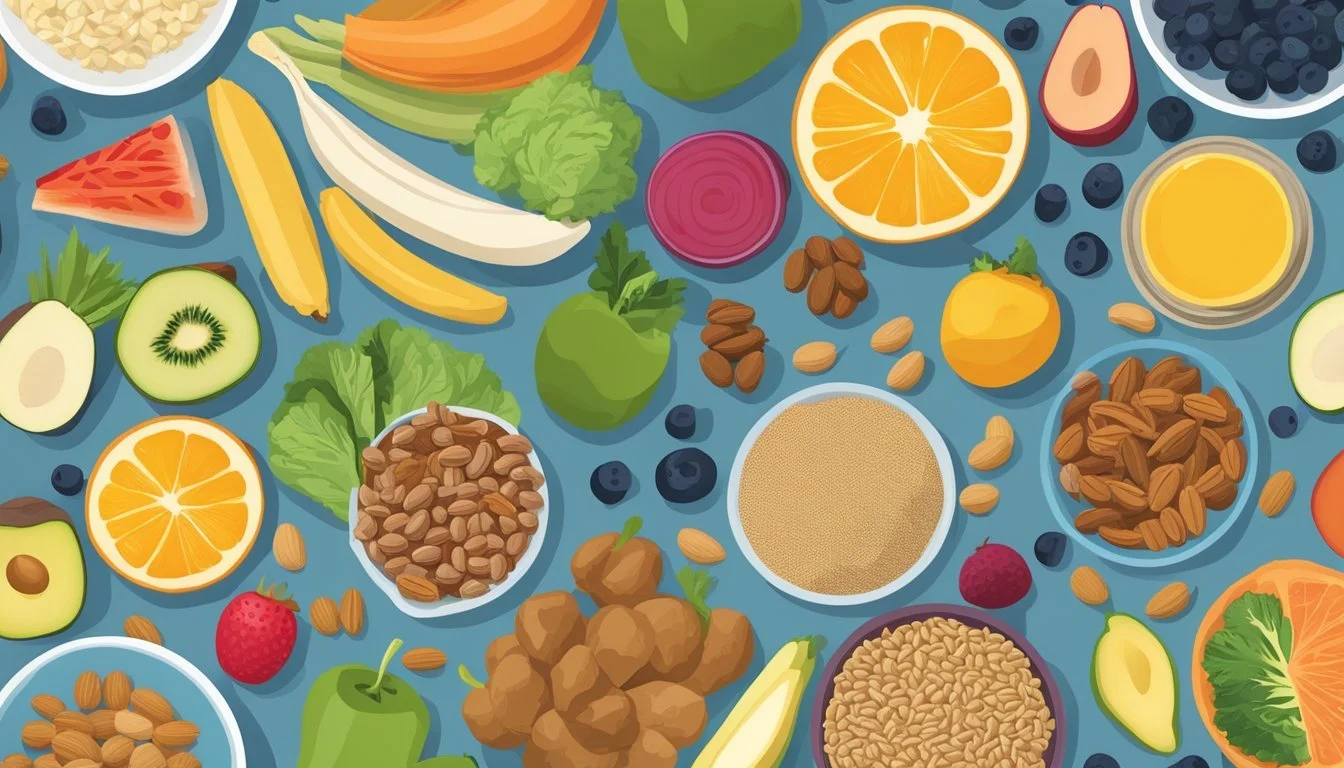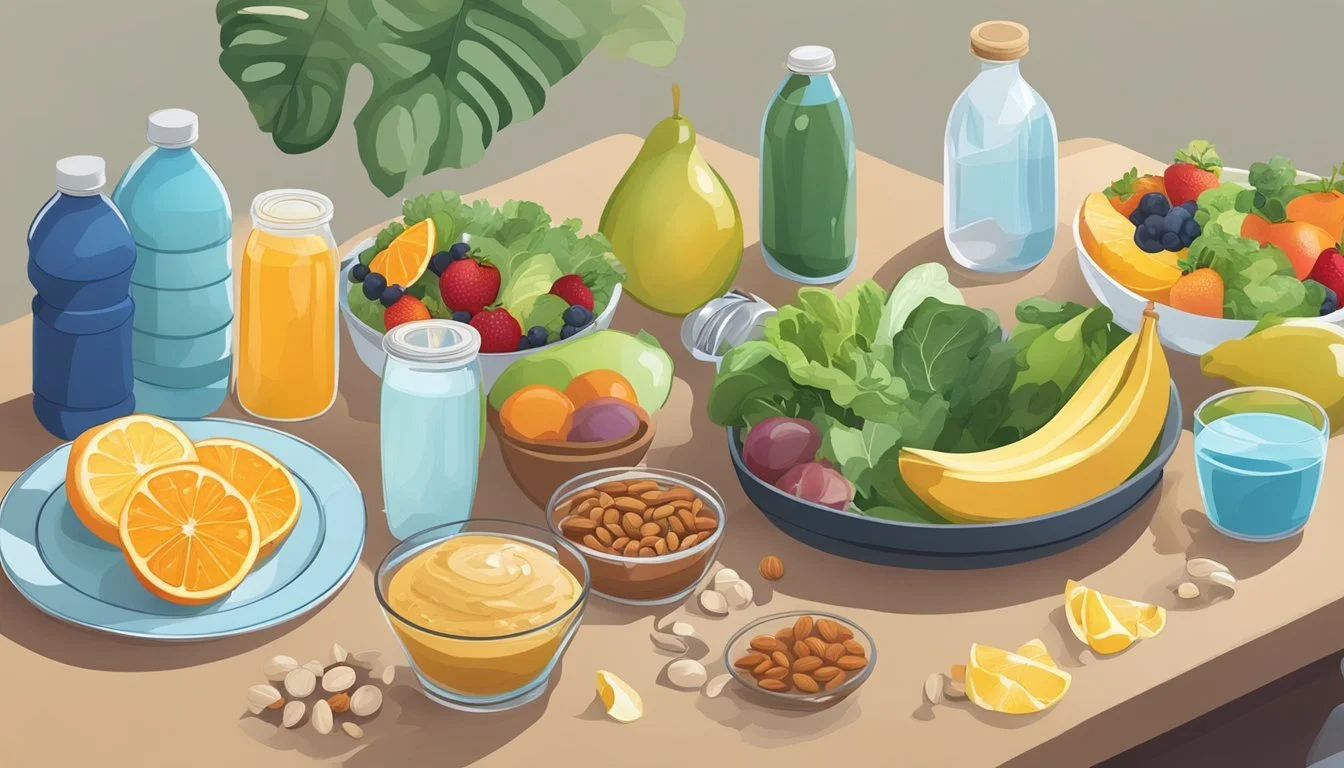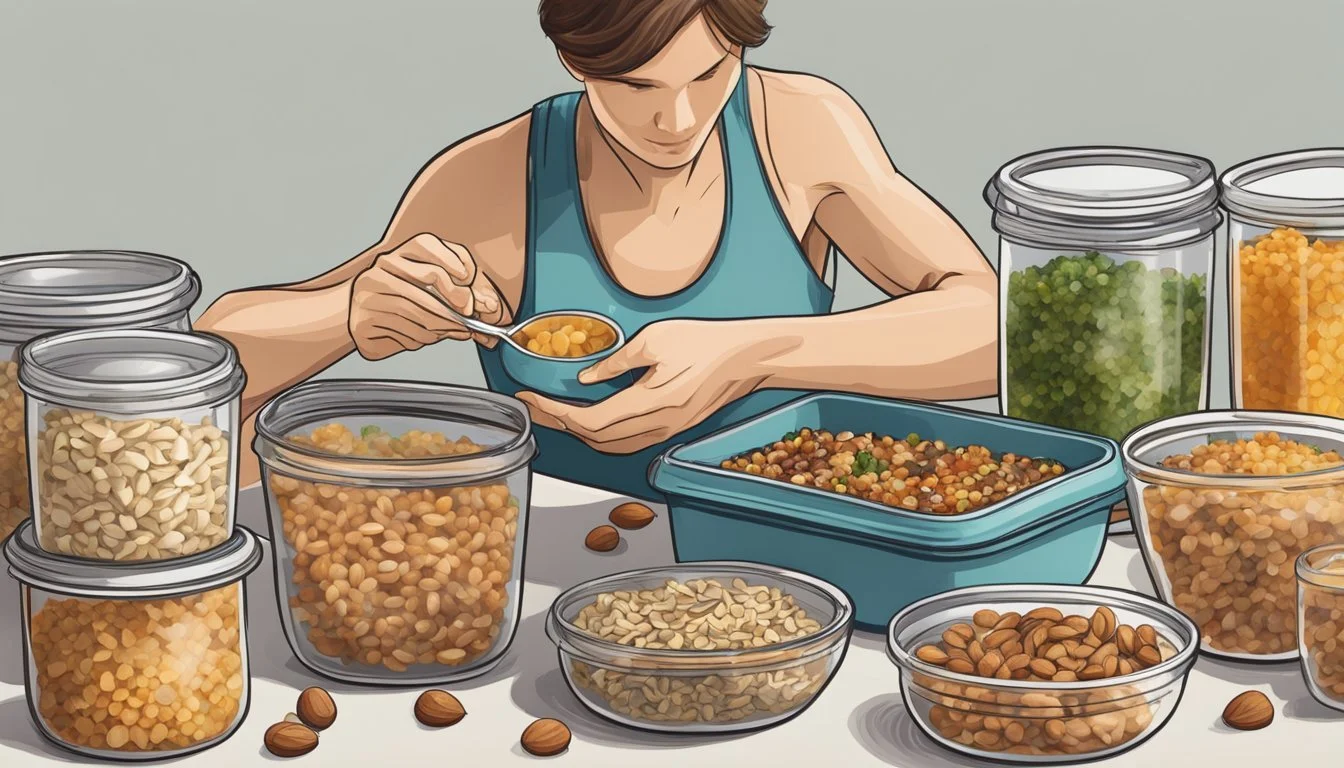Grain-Free Eating for Endurance Athletes
Optimal Marathon Nutrition Strategies
Grain-free eating has emerged as a compelling dietary approach among endurance athletes, particularly marathon runners. The emphasis on eliminating grains is centered on the idea that this can reduce inflammation, improve nutrient absorption, and optimize energy utilization, all of which are critical factors in endurance sports. This dietary strategy involves sourcing carbohydrates from fruits, vegetables, nuts, and seeds rather than traditional grain-based foods, with the goal of sustaining a runner's energy needs through alternative, and potentially more nutrient-dense, food choices.
While traditional marathon nutrition has heavily relied on carbohydrate-loading with grain-based foods, the grain-free philosophy underscores the importance of quality over quantity in carbohydrate intake. This approach also often leads to higher consumption of fats and proteins, which can contribute to a feeling of satiety and provide the necessary amino acids for muscle repair. The adaptation to grain-free eating requires careful planning to meet the energy demands of high mileage training while also ensuring the body is adequately fueled on race day.
Transitioning to grain-free eating does not mean a runner will lack the necessary energy for endurance running. Instead, it is about strategically selecting foods that provide a sustained release of energy, maintain stable blood sugar levels, and support overall health. By choosing a variety of nutrient-rich, grain-free foods, runners may experience stable energy during long runs and improved recovery after workouts. However, it's crucial to personalize the diet to accommodate individual digestive preferences and nutritional needs, especially leading up to and during a marathon, where nutrition plays a pivotal role in performance.
Engaging in grain-free eating can be a beneficial choice for endurance athletes seeking to optimize their performance and overall well-being. Understanding the potential impact of a grain-free diet on grain-free endurance is essential for athletes looking to fuel their training and competitions effectively.
Exploring the long-term pros and cons of a grain-free diet is crucial for endurance athletes considering this dietary approach. By being mindful of the potential health benefits associated with the grain-free introduction, athletes can make informed choices that align with their performance and recovery goals.
For athletes managing grain-free autoimmune diseases, incorporating grain-free eating can provide a supportive and health-conscious approach to fueling endurance activities. Additionally, considering the potential effects of a grain-free diet on grain-free fertility can provide valuable insights into the holistic impact of this dietary approach for athletes.
Furthermore, incorporating grain-free bread into the diet can offer a versatile and nutritious option for athletes seeking to maintain a grain-free lifestyle while enjoying delicious and satisfying meals.
By embracing the health benefits of grain-free eating for endurance athletes, individuals can optimize their performance and overall well-being, ensuring that their dietary choices support their athletic endeavors effectively.
The Basics of Grain-Free Eating
Grain-free diets are quickly becoming a popular nutritional strategy among endurance athletes, focusing on eliminating grains to potentially improve overall health and performance.
Defining Grain-Free Diets
A grain-free diet excludes all grains and grain-derived products. This means avoiding wheat, barley, rye, and oats, as well as foods like bread, pasta, and cereal. Individuals following this diet seek their macronutrients from other sources to maintain energy for endurance activities.
Pros and Cons of Grain-Free
Pros:
Improved Digestion: Some athletes find that grain-free diets reduce inflammation and digestive issues.
Nutrient-Dense Alternatives: Incorporating more fruits, vegetables, and nuts can increase the intake of vitamins and minerals.
Cons:
Potential Energy Deficit: Grains are a traditional source of carbohydrates, which are critical for glycogen stores.
Nutrient Imbalance: Careful planning is required to ensure adequate nutrient intake, especially for endurance performance.
Grain Alternatives for Endurance
Grain-free fueling for endurance athletes relies on various foods that are rich in calories and nutrients. Here are some alternatives:
Root vegetables: Such as sweet potatoes and beets, provide complex carbohydrates.
Fruits: Especially bananas and dates, offer quick energy and are rich in nutrients.
Nuts and seeds: High in healthy fats and proteins, they are energy-dense and support sustained performance.
Nutritional Needs of Endurance Athletes
The marathon requires strategic nutrition planning focused on precise macronutrient ratios, essential micronutrients and minerals, and effective hydration techniques to maintain peak performance.
Macronutrients for Marathon Training
Endurance athletes should aim for a balanced intake of macronutrients tailored for sustained energy output and recovery. Protein plays a critical role in muscle repair and should be consumed at a rate of approximately 1.2-2.0 grams per kilogram of body weight daily. Sources of protein for grain-free diets may include lean meats, fish, and dairy products.
Carbohydrates are the primary fuel for endurance exercise, and grain-free athletes can obtain them from fruits, vegetables, and alternative starches like sweet potatoes. The goal is to consume complex carbohydrates that provide a steady release of energy.
Healthy fats should not be overlooked as they are vital for long-term energy, hormone production, and nutrient absorption. Avocado, nuts, and seeds are excellent sources of healthy fats that can be integrated into a grain-free diet.
Micronutrients and Minerals
Micronutrients and minerals such as iron, calcium, magnesium, and vitamins are indispensable for an endurance athlete's performance and recovery. Athletes following a grain-free diet must ensure adequate iron intake to prevent deficiency anemia, which is crucial for oxygen delivery to muscles. Leafy greens, legumes, and red meat are beneficial for iron.
Vitamins, particularly B vitamins, vitamin C, and vitamin D, play a role in energy production and immune system function. They are obtainable through a diverse diet rich in vegetables, fruits, and fish.
Hydration Strategies
Hydration is essential for maintaining endurance performance, as even mild dehydration can impair physical ability. Endurance athletes should focus on consuming enough water before, during, and after training or events to replace fluid losses. Specific guidelines suggest drinking about 500-700 ml of water at least two hours before exercise and 150-250 ml every 15-20 minutes during exercise, if tolerable.
Including electrolytes like sodium and potassium in fluids can help sustain electrolyte balance, especially during long training sessions or races. These can be sourced from electrolyte-infused waters or natural foods such as bananas and coconut water.
Pre-Training Nutrition
For endurance athletes, particularly those training for a marathon, pre-training nutrition is critical to optimize energy stores and ensure the body has the fuel needed for long-distance efforts. Meal timing and the composition of foods consumed can greatly impact glycogen storage and energy levels.
Meal Timing and Frequency
Meal planning should consider both the timing and frequency of food intake to maintain consistent energy levels. Athletes should aim to eat a substantial meal containing a balance of macronutrients—primarily carbohydrates—2 to 4 hours before a training session to allow for digestion and glycogen synthesis. Smaller snacks can be consumed closer to the workout, about 30 minutes to an hour prior, to top off energy stores.
Example Training Day Meal Plan:
Time Meal Type Foods 6:00 AM Breakfast Oatmeal with banana and honey 9:00 AM Pre-Run Snack Apple or a small serving of rice cakes 12:00 PM Post-Run Meal Grilled chicken with sweet potato 3:00 PM Snack Mixed nuts or a protein shake 6:00 PM Dinner Salmon with quinoa and steamed veggies 9:00 PM Evening Snack Greek yogurt with berries
Pre-Run Foods and Suggestions
For the pre-run meal, especially one that precedes a marathon training session, the focus should be on carbohydrates, which are the primary source of energy and critical for replenishing glycogen stores. The foods should be easy to digest to minimize gastrointestinal discomfort during running.
Carbohydrates:
Simple Carbs: Fruits like bananas provide quick energy.
Complex Carbs: Oatmeal, sweet potatoes, and rice are excellent for sustained energy release.
Athletes should be aware of their own caloric needs, as these can vary greatly depending on factors such as weight, gender, and training intensity. Personal experimentation with different foods and timing will help determine the most effective pre-training nutrition strategy for individual needs.
Grain-Free Options for Peak Performance
Endurance athletes seek diverse nutrient sources for energy and performance. This section focuses on grain-free options that support glycogen stores and optimize macronutrient balance without inciting common issues like fatigue or bloating.
High-Energy Grain-Free Foods
Athletes can maintain high energy levels by choosing grain-free foods rich in complex carbohydrates, healthy fats, and proteins. Key options include:
Seeds: Chia, flaxseed, and pumpkin seeds are dense in energy and omega-3 fatty acids.
Nuts: Almonds, walnuts, and cashews provide sustained energy and are packed with protein.
Fruits: Bananas, oranges, and berries offer natural sugars and essential vitamins.
Vegetables: Sweet potatoes and squash are excellent for their carbohydrate content and dietary fiber.
Eggs: A high-quality protein source that also contains vital micronutrients.
Avocado: Rich in monounsaturated fats, avocados help in maintaining energy levels.
Incorporating these foods into one's diet helps in fueling endurance activities effectively while keeping grain-related issues at bay.
Optimizing Macros without Grains
Athletes can achieve a well-rounded macronutrient profile without relying on grains by focusing on the following:
Proteins: Essential for repair and recovery, athletes can consume eggs and nuts to meet their protein needs, with the guideline of 1.2-2.0 g/kg/day.
Fats: Crucial for long-term energy, sources like seeds and avocados provide healthy fats that support sustained performance.
Carbohydrates: Vital for replenishing glycogen stores, fruits and vegetables like bananas and sweet potatoes are excellent grain-free carb options.
By carefully selecting and combining various grain-free foods, athletes minimize digestion-related issues such as bloating and provide their bodies with the necessary nutrients for peak performance.
Intra-Training Nutrition and Fueling
Proper nutrition during marathon training is crucial for maintaining energy and preventing glycogen depletion. Runners should focus on timely intake of calories and carbohydrates to sustain long-duration activities.
During the Run
During a marathon training run, athletes should ensure that they consume enough carbohydrates to maintain their energy levels and prevent glycogen stores from depleting. A strategy for prolonged runs is to intake carbohydrates in the form of easily digestible foods or gels every 30 to 45 minutes. When considering grain-free options, fruits such as apples and bananas make excellent choices due to their natural sugar content for a quick release of energy. It's important to consume approximately 30-60 grams of carbohydrates per hour to sustain energy levels.
Examples of carbohydrate-rich, grain-free foods:
Apple (medium): ~25g carbs
Banana (medium): ~27g carbs
Quick Energy Sources
For immediate energy, runners often turn to simple sugars that are quickly absorbed and used by the muscles. While sugar should generally be consumed in moderation, during endurance activities like marathon training, it serves as a rapid source of energy. Items like honey packets, dried fruit, or even small pieces of dark chocolate can provide quick carbohydrates while keeping the diet grain-free. Runners should aim for sources that provide energy without causing gastrointestinal discomfort.
Grain-free quick energy foods:
Honey packet (1 tablespoon): ~17g carbs
Dried dates (2 pieces): ~36g carbs
Dark chocolate (1 small square): ~5g carbs
Post-Training Nutrition for Recovery
Proper nutrition post-training is crucial for recovery, focusing on replenishing muscle glycogen, reducing inflammation, and repairing tissue.
Recovery Foods and Meals
Whole Foods for Glycogen Replenishment:
Brown rice, quinoa, sweet potatoes for complex carbohydrates.
Protein Sources for Muscle Repair:
Fish, eggs, tofu for high-quality proteins.
Healthy Fats to Combat Inflammation:
Nuts, seeds, and avocado; olive oil as a dressing or cooking oil.
Recovery Macros and Micros
Macronutrients:
Carbohydrates: Essential for restoring glycogen stores.
Proteins: Support muscle repair and recovery.
Fats: Help manage inflammation and contribute to overall energy.
Micronutrients:
Antioxidants in fruits and vegetables to reduce oxidative stress.
Electrolytes such as sodium, magnesium, and potassium to replenish what is lost through sweat.
Grain-Free Eating Throughout Race Day
When preparing for a marathon, it’s crucial to fuel the body adequately on race day, especially for those adhering to a grain-free diet. Endurance athletes need to harness alternate sources of carbohydrates to maintain energy levels and performance.
Pre-Race Meal: Athletes should consume a high-carbohydrate meal 3-4 hours before starting. Options like sweet potatoes, bananas, or a smoothie with fruits and nut butter provide readily available energy without grains. This meal primes glycogen stores, the body’s preferred energy source during endurance activities.
During the Marathon:
Carbohydrates: Every hour, runners should aim for 30-60 grams of carbohydrates. Grain-free energy gels, chews, or bars are convenient sources.
Hydration: Drinking fluids with added electrolytes aids in maintaining hydration levels without compromising on electrolyte balance.
Monitoring and adjusting intake based on individual sweat rates and gastrointestinal comfort is essential.
Post-Race Recovery:
Carbohydrates: To replenish glycogen stores, consume a mix of fruits, such as oranges or berries, within 30 minutes post-race.
Protein: Including a source of protein aids muscle recovery. Consider adding a protein shake or eating eggs.
Hydration: Continue to hydrate well after crossing the finish line to assist in the recovery process.
By substituting grains with alternative carbohydrate sources and focusing on balanced hydration, grain-free endurance athletes can sustain energy, maximise performance, and recover efficiently on race day.
Designing Your Grain-Free Marathon Diet Plan
Crafting a grain-free meal plan for a marathon requires careful attention to ensure balance across macronutrients to meet caloric needs and to maintain energy levels. High-quality proteins and fats become prominent energy sources, substituting the role traditionally fulfilled by grains.
Creating a Balanced Grain-Free Meal Plan
With grains off the menu, a runner must seek alternative carbohydrate sources to fuel long training sessions and the race day itself. Sweet potatoes, fruits, and root vegetables serve as excellent replacements, offering necessary carbs for energy. Leafy greens and cruciferous vegetables provide essential micronutrients without the bulk of grains.
Proteins are pivotal in muscle recovery and maintenance. Options such as chicken, fish, and eggs offer high quantities of protein that aid in repairing muscle tissues affected by rigorous workouts. For vegetarians, legumes and certain dairy products like Greek yogurt can be good protein substitutes.
Fats should not be overlooked—they're crucial for sustained energy, especially in long-distance runs. Healthy fats can be sourced from avocados, nuts, seeds, and olive oil. These foods contribute both to satiety and the provision of long-lasting fuel.
A sample grain-free meal plan could look like this:
Breakfast: Scrambled eggs with spinach and a side of sliced avocado
Lunch: Grilled chicken salad with mixed greens, nuts, and an olive oil dressing
Dinner: Baked salmon with a side of roasted sweet potatoes and steamed broccoli
Snacks: Nut butter with celery sticks, Greek yogurt with berries
Consulting a Registered Dietitian
Every athlete's dietary requirements are unique, thus consultation with a registered dietitian is recommended for personalization of the meal plan. A dietitian can provide specific guidance on individual caloric needs based on training intensity, body composition, and personal goals.
They can also ensure that the diet plan maintains a satisfactory proportion of macronutrients—carbohydrates, proteins, and fats—to support the athlete's energy requirements while mitigating any potential nutritional deficiencies.
In summary, a well-designed grain-free meal plan for marathon training is multifaceted and should be tailored to the individual's specific energy and nutritional needs, with professional guidance advised for optimal results.
Supplementation and Grain-Free Diets
Endurance athletes on grain-free diets need to ensure they are meeting their nutritional demands through alternative sources. Supplementing may be essential to maintain a balanced intake of vitamins and minerals.
When to Consider Supplements
Athletes should consider supplements when their nutrient-dense diets lack particular vitamins or minerals essential for performance and recovery. For those on grain-free diets, it's especially important to evaluate their intake of micronutrients commonly found in grains. If blood tests reveal deficiencies, or when significant dietary restrictions are in place, supplementation might be necessary.
Common Supplements for Endurance
The following list outlines commonly used supplements to support endurance training in the context of a grain-free diet:
Vitamins: B-complex vitamins are vital for energy production, and since grains are often fortified with these, athletes may need a B-vitamin complex supplement.
Minerals: Calcium and magnesium supplements can be crucial since whole grains are a common source of these minerals for endurance energy metabolism and muscle function.
Antioxidants: Vitamins C and E, as well as selenium, support recovery by counteracting oxidative stress from prolonged exercise.
Iron: Critical for oxygen transport; supplementation may be beneficial, particularly for female athletes or those with identified iron-deficiency anemia.
Amino acids: Essential for muscle repair and recovery, especially branched-chain amino acids (BCAAs), which must be ingested through diet or supplements.
Omega-3 fatty acids: These promote heart health and may reduce inflammation, which can be beneficial during rigorous training schedules.
Endurance athletes should consult with a sports nutritionist to tailor supplementation to their individual needs, diet, and health profile.
Common Challenges and Solutions
Transitioning to a grain-free diet while training for a marathon presents unique nutritional challenges. Athletes must address potential deficiencies and digestive concerns while maintaining an energy-rich, healthy diet.
Avoiding Nutrient Deficiencies
When they eliminate grains, runners may risk insufficient intake of certain nutrients, particularly carbohydrates and fiber. Grains are a traditional source of these nutrients, crucial for sustaining energy levels.
Solutions:
Carbohydrates: They can substitute traditional grain sources with starchy vegetables like sweet potatoes and fruits like bananas to maintain adequate carbohydrate intake for energy.
Fiber: To ensure enough fiber, one can include a variety of nuts, seeds, and non-starchy vegetables in their meals.
Protein: Adequate protein can be achieved through lean meats, fish, eggs, and legumes, which support muscle repair and recovery.
Overcoming Digestive Issues
A grain-free diet may lead to digestive problems such as bloating and inflammation if not properly managed, as the body adapts to different fiber sources.
Solutions:
Bloating: They should gradually introduce increased fiber from fruits and vegetables to allow the digestive system to adapt.
Inflammation: Anti-inflammatory foods like leafy greens, blueberries, and fatty fish can help manage inflammation.
Healthy Fats: Including foods high in omega-3 fatty acids, such as avocados and fish oil, can aid digestion and provide sustained energy.
By carefully selecting alternative foods and monitoring their body's response, runners can overcome the challenges presented by a grain-free diet and maintain a nutritionally complete diet that supports their endurance training.
Long-Term Health and Grain-Free Eating
When considering a grain-free diet, endurance athletes need to assess the viability and health implications of such a dietary change over an extended period.
Sustainable Practices
Endurance athletes who choose to adopt a grain-free eating approach must emphasize the sustainability of their food choices. They should prioritize a balance of macronutrients from diverse sources such as legumes, pseudocereals like quinoa and buckwheat, and high-quality proteins including tofu and tempeh. This allows for a robust nutrient intake without the inclusion of grains. It is vital to ensure that this diet supports their lifestyle, providing consistent energy for training sessions and recovery needs.
Athletes should also consider the environmental impact of their food choices, favoring locally sourced and seasonal foods to minimize their ecological footprint. Sustainable practices in diet not only refer to the impact on the planet but also to the feasibility of maintaining the diet long-term without negative health consequences.
Impact on Overall Health
A grain-free diet should not compromise an athlete's overall health. They must ensure that their diets are rich in vitamins and minerals, which can be obtained through a variety of fruits and vegetables. The elimination of grains must be counterbalanced by other nutrient-dense foods to prevent deficiencies.
Research suggests that a well-planned grain-free diet can provide long-term health benefits, but this is not inherently healthier than diets that include grains. Endurance athletes need to monitor their health parameters regularly for signs of any deficits or imbalances and continuously adapt their diet to meet nutritional needs. It is crucial that such an eating plan supports the athlete's training and life without undermining their health.
Conclusion
Adopting a grain-free diet for endurance activities such as marathon training involves careful consideration of nutritional intake to ensure peak performance and optimal recovery. Runners should focus on obtaining energy from alternative carbohydrate sources such as starchy vegetables and fruits. They must ensure adequate protein intake to repair and build muscle, with an emphasis on lean meats, eggs, and plant-based proteins.
Carbohydrate Alternatives:
Starchy vegetables: sweet potatoes, squash
Fruits: bananas, berries, oranges
Protein Sources:
Lean meats: chicken, turkey
Plant-based: lentils, chickpeas, quinoa
Healthy fats play a crucial role in a grain-free diet, providing a sustained energy source. Sources of healthy fats include avocados, nuts, and seeds, which also offer additional micronutrients essential for an athlete's health. Hydration is integral, with water intake tailored to maintain clear or light yellow urine, indicating proper hydration levels.
For an endurance athlete, the balance of macronutrients and hydration is critical to maintain energy levels and support the body's recovery process post-exercise. By emphasizing a rich variety of whole foods, athletes following a grain-free diet can fulfill their nutritional requirements without relying on grains.
In summary, grain-free eating, when managed properly, can be conducive to endurance and recovery in the context of marathon training, provided that a runner's overall nutrition remains balanced and tailored to their individual needs.












